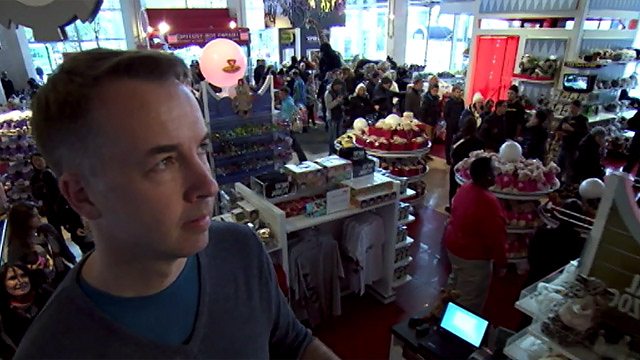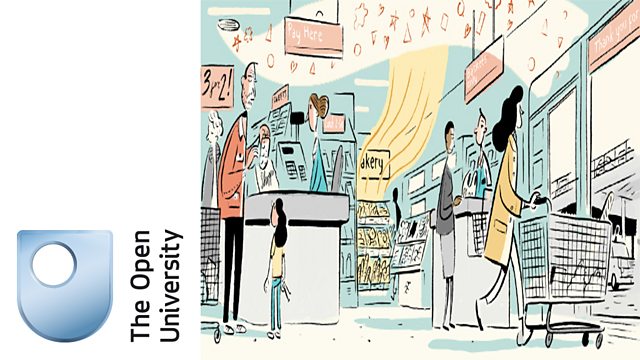Jay Doubleyou: sustainable development
... this evening BBC 2 TV took us in a similar direction, looking at 'planned obsolescence':
▶ The Men Who Made Us Spend - Episode 1 - Video Dailymotion
Clips
Our summer buying habits
In summer what we buy changes as quickly as our outfits do - and in surprising ways.
Watch a clip from BBC One'sSupermarket Secrets
Watch a clip from BBC One'sSupermarket Secrets
For those of you who don't have access to UK TV programmes, here are some highlights:
There is the Phoebus 'conspiracy' when manufacturers of light bulbs got together to limit how long their product could be used:
Phoebus cartel - Wikipedia, the free encyclopedia
Phoebuskartell – Wikipedia
Planned Obsolescence: The Light Bulb Conspiracy | Economics Student Society of Australia (ESSA)
Planned Obsolescence or, why light bulbs die after 1000h? Even if not official or Government regulated, exists. Should it? | A conversation on TED.com
And there is the no-it-wasn't-a-conspiracy proposition:
Planned Obsolescence - Centennial Light Bulb - YouTube
During the Cold War, it was part of the 'democratic way of life' in the USA to spend:
1950s Lesson Plans & Worksheets | Lesson Planet
1950s: The Happy Days? | DocsTeach: Activities
The Rise of American Consumerism . Tupperware! . WGBH American Experience | PBS
Although people were questioning this trend:
.
The Man in the White Suit (1951), directed by Alexander Mackendrick - YouTube
The Man in the White Suit - Wikipedia, the free encyclopedia
The man who 'invented' planned obsolescence was the head of General Motors - which was to become the largest automotive manufacturer in the world:
Alfred P. Sloan - Wikipedia, the free encyclopedia
The Degradation of Work Revisited: More of the Same: The Rise of Sloanism and Flexible Mass Production
What Apple Can Learn from Legendary GM President Alfred P. Sloan - CBS News
Note the use of 'new' in this advert from the 1950s:
.
Chevrolet 1955 Motoramic New Car Advertisement / General Motors Infomercials No. 7 of 10 - YouTube
As far as the UK was concerned, it was Anthony Fisher who set up a 'think tank' to influence the media about these things - especially the idea of making us free as consumers in the market place:
Antony Fisher - Wikipedia, the free encyclopedia
The Fisher Recipe For Successful Think Tanks
But, again, there were questions about this trend:
Dawn of the Dead (1978) - Trailer - YouTube
Dawn of the Dead - Wikipedia, the free encyclopedia
Then came along Computer Aided Design:
AutoCAD - Wikipedia, the free encyclopedia
Computer Aided Design - YouTube
Followed by Ikea:
Spike Jonze Ikea ad - YouTube
IKEA in Fight Club - YouTube
And of course, Apple:
Hundreds Queue in Sydney to be First With iPhone 5s and 5c - YouTube
Here are some really old phones:
Don't Be a Victim of Planned Obsolescence | Modern Species
Planned obsolescence - Wikipedia, the free encyclopedia
And here are some more really old phones:
The Story of E-Waste: What Happens to Tech Once It's Trash | Maximum PC
Jay Doubleyou: the story of stuff
During the 2011 riots in London, the topmost items which were looted were... mobile phones

Ping me baby*: Ping Me Baby!
The mobile phone shops were obviously targets, with many in the particular areas of London reportedly cleaned out. I’m not surprised. I’m sure I read that one Carphone Warehouse was completely ransacked of every single device.
Mobile phones are obviously a highly desirable, highly transportable, highly valuable commodity. It makes sense that looters selected those stores instead of, say, bookshops. There’s plenty of stories on the news of people whisking off flatscreen TVs and so on. They’re just not as easily transportable as, say, an iPhone or the very latest Samsung Galaxy.
London Riots: I hope the phone companies are disabling all their stock | Mobile Industry ReviewLONDON RIOTS 2011: They stole EVERYTHING! Enfield to Clapham shops stripped bare | Mail Online
Have you heard of I-Pod's Dirty Secret?
iPod's Dirty Secret - YouTube
Neistat Brothers - Wikipedia, the free encyclopedia
Or you could always do it yourself:

iFixit is a private company in San Luis Obispo, California. Founded in 2003 while the founders were attending Cal Poly, the company sells repair parts and publishes free wiki-like online repair guides for consumer electronics and gadgets on its web site.[4]
Founder Kyle Wiens aims to reduce electronic waste by teaching people to repair their own gear[9] and offering tools, parts, and a forum to discuss repairs.[10] ... stories of "fixers" met on the trip are posted on the company's activism-oriented blog, ifixit.org.[12][13]
Right to Repair
iFixit is a global community of people helping each other repair things. Let's fix the world, one device at a time.
WHY REPAIR?iFixit: The free repair manual - iFixit
According to a consultant speaking about Apple's products on the programme:
"It is not the job of the consumer to have an opinion."
A debate on planned obsolescence from the continental channel Arte:
Die Wegwerfer | THEMA "Die Wegwerfer" | Welt | de - ARTE
And some very interesting ideas from the Open University:
OU on the BBC: The Men Who Made Us Spend - OpenLearn - Open University
.
.
.









No comments:
Post a Comment